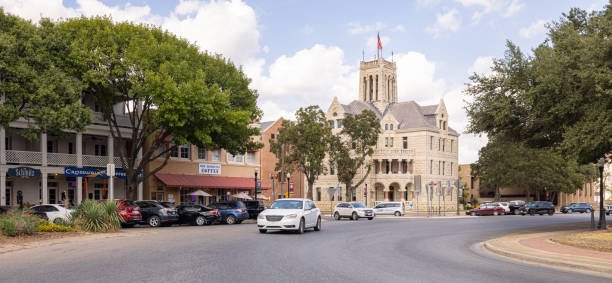
The Story of Lee Hersha in New Braunfels, Texas – Beyond the Headlines
New Braunfels, Texas, is often celebrated for its German heritage, riverside charm, and close-knit community. It’s a place where families enjoy summers at Schlitterbahn, where traditions like Wurstfest attract thousands, and where neighbors still wave to each other on morning walks. But like every growing city, New Braunfels has its share of complicated stories—ones that reflect not only on the individuals involved but also on the community itself.
One such story is that of Lee Hersha, a name that has recently surfaced in public records and online searches tied to New Braunfels. While information about him is scattered, the attention his name has drawn tells us much about how communities handle identity, justice, and reputation in today’s digital age.
This article takes a deep dive into who Lee Hersha is, what’s known about him, what remains uncertain, and how his case sheds light on broader social questions.
Who Is Lee Hersha?
At its core, the information available about Lee Edward Hersha Jr., linked to New Braunfels and Canyon Lake, Texas, comes from public records and arrest reports. His name appears in county databases and community news feeds that aggregate mugshots and legal data.
However, beyond that, little is firmly established. There are no widely available biographical details—no public career profile, no clear business records, no obvious community leadership roles. This makes Hersha’s story both intriguing and frustrating. He is a figure we know only through fragments, leaving much of the picture incomplete.
But sometimes, those very gaps tell their own story. They point to the way our modern information ecosystem defines people by their lowest moments, whether or not that paints a fair or complete portrait.
Public Records and Their Impact
The most concrete references to Lee Hersha are found in Comal County mugshots and arrest listings. For instance, social media platforms dedicated to sharing local arrest reports (like BustedNewspaper pages) have published his name and photo. These sites thrive on clicks, curiosity, and the drama of seeing a familiar name tied to legal trouble.
But here’s the catch: an arrest record is not a conviction. It is merely a snapshot of one moment—someone being charged or taken into custody. Without access to court filings and final rulings, it’s impossible to know whether Hersha faced conviction, dismissal, probation, or other legal outcomes.
Yet for many people in a town like New Braunfels, where news spreads quickly, the distinction blurs. Once your mugshot circulates online, you are no longer simply “a resident.” You become “that guy who was arrested.”
This blurring of reality versus perception is at the heart of Hersha’s story.
The Reputation Dilemma
New Braunfels may be proliferating—its population has surged past 100,000 in recent years—but it still carries the soul of a small town. In places like this, reputation is currency. Businesses thrive on trust, families are judged by name recognition, and social circles overlap tightly.
When someone’s name appears in arrest records, the ripple effect can be lasting:
-
Employment opportunities shrink. Even if charges are dropped, employers searching for a name online may stumble upon mugshots and think twice.
-
Social standing changes. Neighbors may whisper, friends may distance themselves, and family members may feel the weight of association.
-
Second chances get harder. In tight communities, forgiveness exists, but it often requires effort, accountability, and visible change.
For someone like Lee Hersha, the real story might not just be about what happened in court—it’s about how his name now circulates, often without context, in the digital sphere.
Privacy, Transparency, and the Internet
The Hersha case highlights a larger debate: how much should the public know about private citizens’ legal troubles, and for how long should that information remain accessible?
Supporters of transparency argue:
-
Public arrest logs keep law enforcement accountable.
-
Citizens deserve to know if someone in their community may pose a risk.
-
Open records are part of democracy.
But critics point out:
-
Many mugshot sites profit by posting names without outcomes, creating permanent digital scars.
-
Charges that are later dropped still live online forever.
-
People are defined by their lowest moments, not by their full lives.
This tension plays out across the country, and Hersha’s situation is one more example of how digital permanence complicates human stories.
Themes That Emerge from Hersha’s Story
Even though the specifics of his case remain unclear, the broader implications resonate far beyond New Braunfels.
1. The Fragility of Reputation
In the 20th century, reputations could be repaired through time, effort, and moving to a new place. In the 21st century, Google doesn’t forget. For someone like Hersha, a few clicks may define him for years, regardless of the truth.
2. Community Judgments
Towns like New Braunfels pride themselves on community spirit. But community judgment can be a double-edged sword. It can rally around people in need, but it can also ostracize those associated with mistakes.
3. Justice vs. Mercy
The American justice system is supposed to balance accountability with the possibility of rehabilitation. Yet when public opinion is shaped by mugshots, the “mercy” part often gets lost.
4. Media Responsibility
Websites that post arrest logs rarely follow up. This creates a skewed picture where the public sees accusation but not resolution. Should media outlets do more to provide context?
What We Don’t Know About Hersha
The mystery around Hersha deepens because we lack answers to basic questions:
-
What were the exact charges he faced?
-
Were those charges upheld or dismissed?
-
What has been his personal or professional contribution to New Braunfels?
-
How does he view his own story?
Without these, the public perception of him remains one-dimensional.
Lessons for the Community
Rather than focusing solely on Hersha, his case serves as a mirror for how we as communities handle stories like his.
For Individuals:
Think twice before sharing mugshots or gossip. That one click can influence how someone is perceived for years.
For Communities:
Balance accountability with compassion. Remember that behind every public record is a human being, often with family, struggles, and hopes.
For Media and Online Platforms:
Provide updates, not just sensational headlines. If you report on someone’s arrest, follow up on the outcome.
For Legal Systems:
Continue the conversation about record expungement, especially for minor offenses or cases dismissed without conviction.
Could There Be Redemption?
If Hersha is indeed navigating legal or reputational struggles, the road forward may not be easy. Yet history and human experience suggest that redemption is possible when individuals take steps such as:
-
Owning the past: Acknowledging mistakes, if any, is the first step to moving forward.
-
Contributing positively: Volunteering, working, or mentoring in the community can rebuild trust.
-
Controlling the narrative: Speaking out, even in small ways, can help reshape how people view you.
-
Legal recourse: Pursuing expungement of dismissed charges or addressing inaccuracies online may also help.
Communities often admire people who rise after falling—it’s a story as old as time. The question is whether Hersha will have the opportunity and the platform to write his next chapter.
Why Hersha’s Story Matters Beyond New Braunfels
At first glance, you might wonder why the story of one man in one Texas town matters. But zoom out, and you’ll see:
-
Digital Permanence: Millions of Americans now live with online records defining them.
-
Community Identity: How we treat people like Hersha shapes what kind of communities we build—judgmental or compassionate.
-
Justice Reform: His case points to ongoing debates about how public records intersect with fairness.
So while Hersha’s name may be local, the issues his story raises are undeniably national.
Conclusion
The story of Lee Hersha in New Braunfels, Texas, is not fully told. What exists are fragments: arrest logs, mugshots, and whispers of public record. What’s missing is the full context—the outcomes, the human backstory, and the path forward.
But perhaps that’s exactly why it matters. Hersha’s story shines a light on how quickly reputations are formed in the digital age, how communities struggle between judgment and mercy, and how individuals are often trapped in narratives not of their own making.
For New Braunfels, this is more than just about one man. It’s about what kind of city it wants to be—one that reduces people to mugshots or one that embraces the complexity of human lives.
In the end, the question is not just Who is Lee Hersha? But also, who are we, as neighbors, when we define others by their worst day instead of their whole story?


